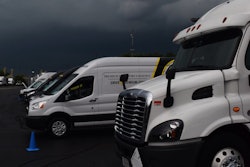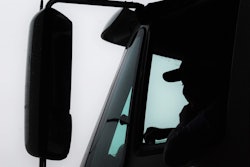A book I’m reading, “The Anticipatory Organization” by Daniel Burrus, focuses a great deal on the coming technologies. It makes me think about what’s working well, or at least close to my expectations. At the same time, it’s changing some of what I want to believe about my business.
 Gary Buchs, the author of this post, self-dispatches under lease to Landstar, utilizing a variety of the company’s independent freight agents for loads.
Gary Buchs, the author of this post, self-dispatches under lease to Landstar, utilizing a variety of the company’s independent freight agents for loads.For example, I’m not real keen on the autonomous truck technologies. I am first concerned with the jobs and quality of life and the effects on our society if we lose these jobs.
Can the artificial intelligence (AI) community program a truck to drive itself? Yes, they’ve proven as much.
But there is a deeper part of me that tries to visualize what the “autonomous highway” might actually turn out to be. What I see is a reality that is somewhere between the sci-fi robotics of the future and how we do things today. We are going to do transportation differently, and as much as I hate to say this, we need to. Transportation overall is too inefficient in so many ways, whether due to time and energy wasted or lack of good customer service. We can do this better.
So what’s stopping us?
A good place for the owner-operator to start would be at zero. Stop focusing on the rear-view mirror and look forward with anticipation. We each have thousands of decisions to make, so find ways to use new technologies to free up time for more productive uses.

For example, it’s hard to imagine not using our cellphones to conduct business throughout every day. Our phones have become mini-computers with load board apps, traffic updates, customer contact information, and satellite imaging of locations, docks and parking possibilities. Add to that: time saved with GPS navigation, and many GPS-based apps that make available key information. If you think you don’t want help through technology, ask yourself which of these you would be willing to give up.
Pick just about any problem, search an app store (or the internet generally) for a way to solve it, and you’ll begin to see tools that could help improve your business. Anything from finding solutions for truck parking or repairs to reviews of the quality of the customer service at nearly any business. The information is available, but you must take the time to access it.
When I’m going to a customer for pickup or delivery, I nearly always search for every bit of information I can find — and I still favor the simplest tool of all, a phone call. I’m a little surprised still when customers say how much they appreciate receiving a courtesy call with my ETA or other information. People still want to do some business directly with another person. So it’s my responsibility to be in control, not controlled.
As for the electronic-logging-device, if you’re new to ELDs, have you gained time from not having to fill out, review, organize and store all that paper? If you’re gaining time, as many are after making the switch, think about how to utilize that extra time. Several owner-ops I’ve visited with over the last five years have seen that, after the ELD-adjustment period, they were able to make better business and quality-of-life decisions.
Ask anyone utilizing a well-functioning e-log system about the possibility of returning to a paper log book — you’ll find it’s it is quite rare to find a driver who wants to do it. I’ve found the same things in my own experience.
Setting aside the ELD issue, one of the biggest benefits of technology writ large has been in enjoying the extra time to relax after a long day in the truck. On the business side, the savings in time — our most precious resource — has allowed me to study the markets and pursue new customers, making my business more efficient, which offers me more opportunities.
It is easy to get caught up in the arguments about regulations and technology. But with both increasing, what are the odds that trend will reverse itself? Probably not good. Instead, you can start slowly, anticipate change and be proactive in seeking out ways for new technology to help you deal with regulations and other aspects of our business.











